- Home
- J. G. Ballard
The Complete Short Stories Page 52
The Complete Short Stories Read online
Page 52
'Dear Harry, I've taken the car and deposit box. Sorry it should end like--'
Irritably, Bridgman switched off the memo-tape and its recapitulation of some thirty-year-old private triviality. For some reason he seemed unable to accept Travis and Louise Woodward for what they were. He disliked this failure of compassion, a nagging compulsion to expose other people's motives and strip away the insulating sheaths around their naked nerve strings, particularly as his own motives for being at Cape Canaveral were so suspect. Why was he there, what failure was he trying to expiate? And why choose Cocoa Beach as his penitential shore? For three years he had asked himself these questions so often that they had ceased to have any meaning, like a fossilized catechism or the blunted self-recrimination of a paranoiac.
He had resigned his job as the chief architect of a big space development company after the large government contract on which the firm depended, for the design of the first Martian city-settlement, was awarded to a rival consortium. Secretly, however, he realized that his resignation had marked his unconscious acceptance that despite his great imaginative gifts he was unequal to the specialized and more prosaic tasks of designing the settlement. On the drawing board, as elsewhere, he would always remain earth-bound.
His dreams of building a new Gothic architecture of launching ports and control gantries, of being the Frank Lloyd Wright and Le Corbusier of the first city to be raised outside Earth, faded for ever, but leaving him unable to accept the alternative of turning out endless plans for low-cost hospitals in Ecuador and housing estates in Tokyo. For a year he had drifted aimlessly, but a few colour photographs of the vermilion sunsets at Cocoa Beach and a news story about the recluses living on in the submerged motels had provided a powerful compass.
He dropped the memo-tape into a drawer, making an effort to accept Louise Woodward and Travis on their own terms, a wife keeping watch over her dead husband and an old astronaut maintaining a solitary vigil over the memories of his lost comrades-in-arms.
The wind gusted against the balcony window, and a light spray of sand rained across the floor. At night dust-storms churned along the beach. Thermal pools isolated by the cooling desert would suddenly accrete like beads of quicksilver and erupt across the fluffy sand in miniature tornadoes.
Only fifty yards away, the dying cough of a heavy diesel cut through the shadows. Quickly Bridgman turned off the small desk light, grateful for his meanness over the battery packs plugged into the circuit, then stepped to the window.
At the leftward edge of the sand-break, half hidden in the long shadows cast by the hotel, was a large tracked vehicle with a low camouflaged hull. A narrow observation bridge had been built over the bumpers directly in front of the squat snout of the engine housing, and two of the beach wardens were craning up through the plexiglass windows at the balconies of the hotel, shifting their binoculars from room to room. Behind them, under the glass dome of the extended driving cabin, were three more wardens, controlling an outboard spotlight. In the centre of the bowl a thin mote of light pulsed with the rhythm of the engine, ready to throw its powerful beam into any of the open rooms.
Bridgman hid back behind the shutters as the binoculars focused upon the adjacent balcony, moved to his own, hesitated, and passed to the next. Exasperated by the sabotaging of the roadways, the wardens had evidently decided on a new type of vehicle. With their four broad tracks, the huge squat sand-cars would be free of the mesh roadways and able to rove at will through the dunes and sand-hills.
Bridgman watched the vehicle reverse slowly, its engine barely varying its deep bass growl, then move off along the line of hotels, almost indistinguishable in profile among the shifting dunes and hillocks. A hundred yards away, at the first intersection, it turned towards the main boulevard, wisps of dust streaming from the metal cleats like thin spumes of steam. The men in the observation bridge were still watching the hotel. Bridgman was certain that they had seen a reflected glimmer of light, or perhaps some movement of Louise Woodward's on the roof. However reluctant to leave the car and be contaminated by the poisonous dust, the wardens would not hesitate if the capture of one of the beachcombers warranted it.
Racing up the staircase, Bridgman made his way to the roof, crouching below the windows that overlooked the boulevard. Like a huge crab, the sand-car had parked under the jutting overhang of the big department store opposite. Once fifty feet from the ground, the concrete lip was now separated from it by little more than six or seven feet, and the sand-car was hidden in the shadows below it, engine silent. A single movement in a window, or the unexpected return of Travis, and the wardens would spring from the hatchways, their long-handled nets and lassos pinioning them around the necks and ankles. Bridgman remembered one beachcomber he had seen flushed from his motel hideout and carried off like a huge twitching spider at the centre of a black rubber web, the wardens with their averted faces and masked mouths like devils in an abstract ballet.
Reaching the roof, Bridgman stepped out into the opaque white moonlight. Louise Woodward was leaning on the balcony, looking out towards the distant, unseen sea. At the faint sound of the door creaking she turned and began to walk listlessly around the roof, her pale face floating like a nimbus. She wore a freshly ironed print dress she had found in a rusty spin drier in one of the launderettes, and her streaked blonde hair floated out lightly behind her on the wind.
'Louise!'
Involuntarily she started, tripping over a fragment of the neon sign, then moved backwards towards the balcony overlooking the boulevard.
'Mrs Woodward!' Bridgman held her by the elbow, raised a hand to her mouth before she could cry out. 'The wardens are down below. They're watching the hotel. We must find Travis before he returns.'
Louise hesitated, apparently recognizing Bridgman only by an effort, and her eyes turned up to the black marble sky. Bridgman looked at his watch; it was almost 12.25. He searched the stars in the south-west.
Louise murmured: 'They're nearly here now, I must see them. Where is Travis, he should be here?'
Bridgman pulled at her arm. 'Perhaps he saw the sand-car. Mrs Woodward, we should leave.'
Suddenly she pointed up at the sky, then wrenched away from him and ran to the rail. 'There they are!'
Fretting, Bridgman waited until she had filled her eyes with the two companion points of light speeding from the western horizon. These were Merril and Pokrovski - like every schoolboy he knew the sequences perfectly, a second system of constellations with a more complex but far more tangible periodicity and precession - the Castor and Pollux of the orbiting zodiac, whose appearance always heralded a full conjunction the following night.
Louise Woodward gazed up at them from the rail, the rising wind lifting her hair off her shoulders and entraining it horizontally behind her head. Around her feet the red Martian dust swirled and rustled, silting over the fragments of the old neon sign, a brilliant pink spume streaming from her long fingers as they moved along the balcony ledge. When the satellites finally disappeared among the stars along the horizon, she leaned forwards, her face raised to the milk-blue moon as if to delay their departure, then turned back to Bridgman, a bright smile on her face.
His earlier suspicions vanishing, Bridgman smiled back at her encouragingly. 'Roger will be here tomorrow night, Louise. We must be careful the wardens don't catch us before we see him.'
He felt a sudden admiration for her, at the stoical way she had sustained herself during her long vigil. Perhaps she thought of Woodward as still alive, and in some way was patiently waiting for him to return? He remembered her saying once: 'Roger was only a boy when he took off, you know, I feel more like his mother now,' as if frightened how Woodward would react to her dry skin and fading hair, fearing that he might even have forgotten her. No doubt the death she visualized for him was of a different order from the mortal kind.
Hand in hand, they tiptoed carefully down the flaking steps, jumped down from a terrace window into the soft sand below the wind-break. Bridgman
sank to his knees in the fine silver moon-dust, then waded up to the firmer ground, pulling Louise after him. They climbed through a breach in the tilting palisades, then ran away from the line of dead hotels looming like skulls in the empty light.
'Paul, wait!' Her head still raised to the sky, Louise Woodward fell to her knees in a hollow between two dunes, with a laugh stumbled after Bridgman as he raced through the dips and saddles. The wind was now whipping the sand off the higher crests, flurries of dust spurting like excited wavelets. A hundred yards away, the town was a fading film set, projected by the camera obscura of the sinking moon. They were standing where the long Atlantic seas had once been ten fathoms deep, and Bridgman could scent again the tang of brine among the flickering white-caps of dust, phosphorescing like shoals of animalcula. He waited for any sign of Travis.
'Louise, we'll have to go back to the town. The sand-storms are blowing up, we'll never see Travis here.'
They moved back through the dunes, then worked their way among the narrow alleyways between the hotels to the northern gateway to the town. Bridgman found a vantage point in a small apartment block, and they lay down looking out below a window lintel into the sloping street, the warm sand forming a pleasant cushion. At the intersections the dust blew across the roadway in white clouds, obscuring the warden's beach-car parked a hundred yards down the boulevard.
Half an hour later an engine surged, and Bridgman began to pile sand into the interval in front of them. 'They're going. Thank God!'
Louise Woodward held his arm. 'Look!'
Fifty feet away, his white vinyl suit half hidden in the dust clouds, one of the wardens was advancing slowly towards them, his lasso twirling lightly in his hand. A few feet behind was a second warden, craning up at the windows of the apartment block with his binoculars.
Bridgman and Louise crawled back below the ceiling, then dug their way under a transom into the kitchen at the rear. A window opened on to a sand-filled yard, and they darted away through the lifting dust that whirled between the buildings.
Suddenly, around a corner, they saw the line of wardens moving down a side-street, the sand-car edging along behind them. Before Bridgman could steady himself a spasm of pain seized his right calf, contorting the gastrocnemius muscle, and he fell to one knee. Louise Woodward pulled him back against the wall, then pointed at a squat, bow-legged figure trudging towards them along the curving road into town.
'Travis--'
The tool-bag swung from his right hand, and his feet rang faintly on the wire-mesh roadway. Head down, he seemed unaware of the wardens hidden by a bend in the road.
'Come on!' Disregarding the negligible margin of safety, Bridgman clambered to his feet and impetuously ran out into the centre of the street. Louise tried to stop him, and they had covered only ten yards before the wardens saw them. There was a warning shout, and the spotlight flung its giant cone down the street. The sand-car surged forward, like a massive dust-covered bull, its tracks clawing at the sand.
'Travis!' As Bridgman reached the bend, Louise Woodward ten yards behind, Travis looked up from his reverie, then flung the tool-bag over one shoulder and raced ahead of them towards the clutter of motel roofs protruding from the other side of the street. Lagging behind the others, Bridgman again felt the cramp attack his leg, broke off into a painful shuffle. When Travis came back for him Bridgman tried to wave him away, but Travis pinioned his elbow and propelled him forward like an attendant straight-arming a patient.
The dust swirling around them, they disappeared through the fading streets and out into the desert, the shouts of the beach-wardens lost in the roar and clamour of the haying engine. Around them, like the strange metallic flora of some extraterrestrial garden, the old neon signs jutted from the red Martian sand - 'Satellite Motel', 'Planet Bar', 'Mercury Motel'. Hiding behind them, they reached the scrub-covered dunes on the edge of the town, then picked up one of the trails that led away among the sand-reefs. There, in the deep grottoes of compacted sand which hung like inverted palaces, they waited until the storm subsided. Shortly before dawn the wardens abandoned their search, unable to bring the heavy sand-car on to the disintegrating reef.
Contemptuous of the wardens, Travis lit a small fire with his cigarette lighter, burning splinters of driftwood that had gathered in the gullies. Bridgman crouched beside it, warming his hands.
'This is the first time they've been prepared to leave the sand-car,' he remarked to Travis. 'It means they're under orders to catch us.'
Travis shrugged. 'Maybe. They're extending the fence along the beach. They probably intend to seal us in for ever.'
'What?' Bridgman stood up with a sudden feeling of uneasiness. 'Why should they? Are you sure? I mean, what would be the point?'
Travis looked up at him, a flicker of dry amusement on his bleached face. Wisps of smoke wreathed his head, curled up past the serpentine columns of the grotto to the winding interval of sky a hundred feet above. 'Bridgman, forgive me saying so, but if you want to leave here, you should leave now. In a month's time you won't be able to.'
Bridgman ignored this, and searched the cleft of dark sky overhead, which framed the constellation Scorpio, as if hoping to see a reflection of the distant sea. 'They must be crazy. How much of this fence did you see?'
'About eight hundred yards. It won't take them long to complete. The sections are prefabricated, about forty feet high.' He smiled ironically at Bridgman's discomfort. 'Relax, Bridgman. If you do want to get out, you'll always be able to tunnel underneath it.'
'I don't want to get out,' Bridgman said coldly. 'Damn them, Travis, they're turning the place into a zoo. You know it won't be the same with a fence all the way around it.'
'A corner of Earth that is forever Mars.' Under the high forehead, Travis's eyes were sharp and watchful. 'I see their point. There hasn't been a fatal casualty now' - he glanced at Louise Woodward, who was strolling about in the colonnades - 'for nearly twenty years, and passenger rockets are supposed to be as safe as commuters' trains. They're quietly sealing off the past, Louise and I and you with it. I suppose it's pretty considerate of them not to burn the place down with flame-throwers. The virus would be a sufficient excuse. After all, we three are probably the only reservoirs left on the planet.' He picked up a handful of red dust and examined the fine crystals with a sombre eye. 'Well, Bridgman, what are you going to do?'
His thoughts discharging themselves through his mind like frantic signal flares, Bridgman walked away without answering.
Behind them, Louise Woodward wandered among the deep galleries of the grotto, crooning to herself in a low voice to the sighing rhythms of the whirling sand.
The next morning they returned to the town, wading through the deep drifts of sand that lay like a fresh fall of red snow between the hotels and stores, coruscating in the brilliant sunlight. Travis and Louise Woodward made their way towards their quarters in the motels further down the beach. Bridgman searched the still, crystal air for any signs of the wardens, but the sand-car had gone, its tracks obliterated by the storm.
In his room he found their calling-card.
A huge tide of dust had flowed through the french windows and submerged the desk and bed, three feet deep against the rear wall. Outside the sand-break had been inundated, and the contours of the desert had completely altered, a few spires of obsidian marking its former perspectives like buoys on a shifting sea. Bridgman spent the morning digging out his books and equipment, dismantled the electrical system and its batteries and carried everything to the room above. He would have moved to the penthouse on the top floor, but his lights would have been visible for miles.
Settling into his new quarters, he switched on the tape-recorder, heard a short, clipped message in the brisk voice which had shouted orders at the wardens the previous evening. 'Bridgman, this is Major Webster, deputy commandant of Cocoa Beach Reservation. On the instructions of the Anti-Viral Sub-committee of the UN General Assembly we are now building a continuous fence around the beac
h area. On completion no further egress will be allowed, and anyone escaping will be immediately returned to the reservation. Give yourself up now, Bridgman, before--'
Bridgman stopped the tape, then reversed the spool and erased the message, staring angrily at the instrument. Unable to settle down to the task of rewiring the room's circuits, he paced about, fiddling with the architectural drawings propped against the wall. He felt restless and hyper-excited, perhaps because he had been trying to repress, not very successfully, precisely those doubts of which Webster had now reminded him.
He stepped on to the balcony and looked out over the desert, at the red dunes rolling to the windows directly below. For the fourth time he had moved up a floor, and the sequence of identical rooms he had occupied were like displaced images of himself seen through a prism. Their common focus, that elusive final definition of himself which he had sought for so long, still remained to be found. Timelessly the sand swept towards him, its shifting contours, approximating more closely than any other landscape he had found to complete psychic zero, enveloping his past failures and uncertainties, masking them in its enigmatic canopy.
Bridgman watched the red sand flicker and fluoresce in the steepening sunlight. He would never see Mars now, and redress the implicit failure of talent, but a workable replica of the planet was contained within the beach area.
Several million tons of the Martian top-soil had been ferried in as ballast some fifty years earlier, when it was feared that the continuous firing of planetary probes and space vehicles, and the transportation of bulk stores and equipment to Mars would fractionally lower the gravitational mass of the Earth and bring it into tighter orbit around the Sun. Although the distance involved would be little more than a few millimetres, and barely raise the temperature of the atmosphere, its cumulative effects over an extended period might have resulted in a loss into space of the tenuous layers of the outer atmosphere, and of the radiological veil which alone made the biosphere habitable.

 High-Rise
High-Rise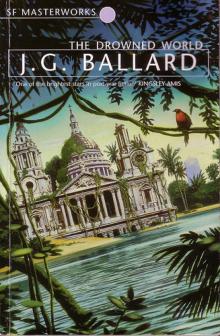 The Drowned World
The Drowned World The Unlimited Dream Company
The Unlimited Dream Company Running Wild
Running Wild The Day of Creation
The Day of Creation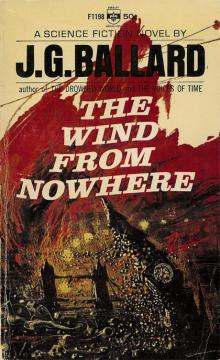 The Wind From Nowhere
The Wind From Nowhere The Complete Short Stories, Volume 2
The Complete Short Stories, Volume 2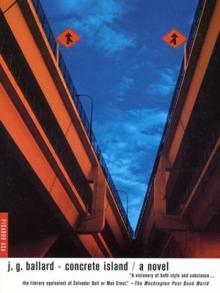 Concrete Island
Concrete Island Empire of the Sun
Empire of the Sun The Kindness of Women
The Kindness of Women Vermilion Sands
Vermilion Sands Super-Cannes
Super-Cannes Millennium People
Millennium People The Complete Stories of J. G. Ballard
The Complete Stories of J. G. Ballard Crash
Crash The Drought
The Drought The Atrocity Exhibition
The Atrocity Exhibition The Complete Short Stories: Volume 1
The Complete Short Stories: Volume 1 Miracles of Life: Shanghai to Shepperton: An Autobiography
Miracles of Life: Shanghai to Shepperton: An Autobiography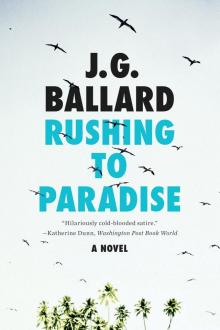 Rushing to Paradise
Rushing to Paradise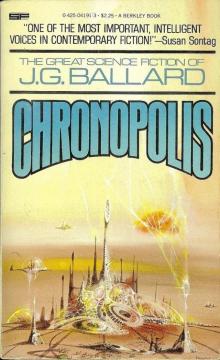 Chronopolis
Chronopolis Cocaine Nights
Cocaine Nights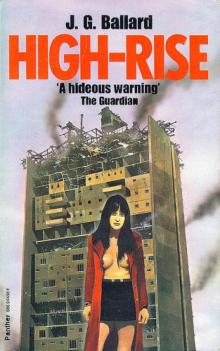 High Rise (1987)
High Rise (1987) The Complete Short Stories
The Complete Short Stories The Day of Creation (Harper Perennial Modern Classics)
The Day of Creation (Harper Perennial Modern Classics) The Crystal World
The Crystal World